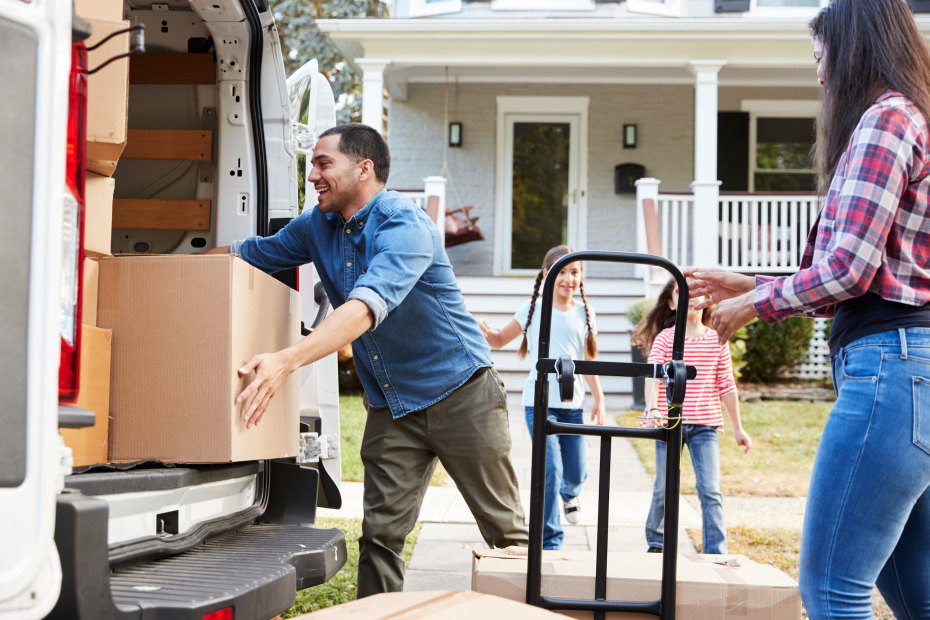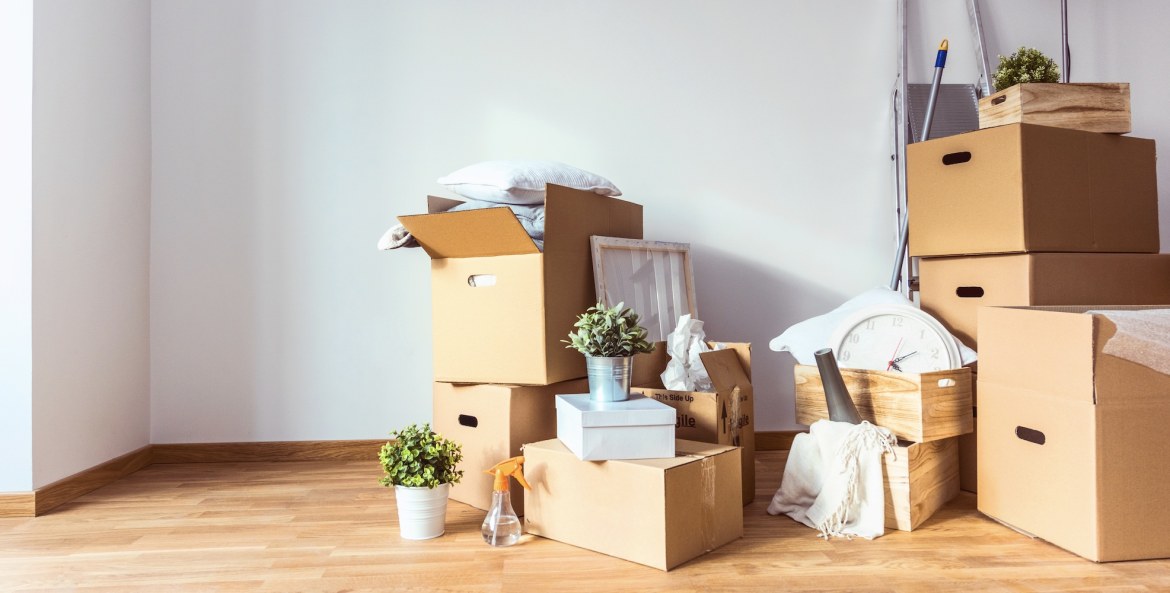Few everyday life events—aside from maybe getting cavities filled or jury duty—elicit more groans than a move. Whether it’s across town or cross country, moving involves a lot of work: You have to comb through and pack all your possessions, transport them, and then deposit and unpack everything in your new home.
“People dread moving, like it’s walking into a surgery,” says Lior Rachmany, founder and CEO of Dumbo Moving and Storage. But the worry that comes with the anticipation of a move often dwarfs the actual stress of the big day, especially when you’ve prepared in advance. Follow the strategy and wisdom of moving experts to get motivated and craft your moving plan.
Is it best to DIY or hire movers?
The first step in any move requires determining if you’ll rent and pack your own truck or hire a moving company. There is no right answer—choosing between a DIY move and involving the pros depends on your personal circumstances.
“Seventy-five percent of moves in this country are do-it-yourself moves, where you rent a truck and move on your own,” says Ali Wenzke, author of The Art of Happy Moving (along with her husband, she’s moved 10 times in 11 years). So it's definitely a realistic option for many, but hiring movers can save time and stress, and ward off potential injuries to precious items (and yourself).
As you weigh the decision, consider both how many items you own and your physical limits, advises Wenzke. Anthony Johnson, CEO of Pack It Movers, agrees. It’s hard to move a couch solo, but don’t expect friends and family to be your fall-back plan. “Friends and family can sometimes help, but aren't always available or up for the challenge of a big job,” says Johnson.
What about paying movers to pack?
If you decide to hire movers, you’ll need to decide whether or not you also want them to pack up your home for you. The big advantages to having your movers pack for you are speed, equipment, and know-how. “Professional movers are fully equipped and qualified to help you with any kind of moving inconvenience,” says Rachmany, from hefting your big-screen TV to knowing what size truck you'll need.
Timing may also be a factor in your decision. “Many customers plan to pack themselves, but simply run out of time,” says Laura Roth, director of customer experience at UniGroup, parent company to United Van Lines and Mayflower Transit.
If someone packs up your home, you’ll want to make sure a thorough inventory is done of all your belongings. The moving company can handle that task, says Roth, just review the list before you sign off. And even if the pros are packing for you, make sure to secure the valuables you can’t live without (think your laptop, jewelry, and passport) and move them yourself.

If you decide to DIY, make sure to give yourself plenty of time to pack and prep.
What do you need to do to get started?
Start early—much earlier than you first think. The smoothest, stress-free moves are preceded by a good plan, along with a thorough declutter.
“Your packing process should really start months in advance by considering what you want to have in your new residence,” says Kevin Kleckner, director of national consumer sales and programs at Penske. That’s not always possible, but aim to start packing at least a few weeks in advance. “Start with your closets or basements (if you have one) where some of your least used or seasonal items may be located,” recommends Kleckner. Ideally, you’ll have an empty space—the guest room or garage, for instance—where you can store packed items.
Before you pack, declutter.
“Decluttering is one of the most important pre-move tasks,” says Rachmany. And Wenzke agrees: “As soon as you know you’re moving, please start decluttering. It will save you time and money on both ends of the move.”
Rachmany recommends sorting items into four categories: keep, donate, sell, throw away. Wenzke offers a different strategy, focusing on large, heavy items first. It’s far better to sell or donate a couch before your move, then to schlep it to your new home and get rid of it once you arrive.
Grab supplies.
If you’re moving, you’ll need supplies—and lots of them.
See-through, plastic crates (which you can easily rent) can be very convenient. “Not only are they stable and waterproof, offering additional protection from the city streets, but they’re also environmentally friendly,” Rachmany says. He also notes that vacuum-sealed bags work well for clothing since they pack things up tightly and without wrinkles. Moving companies like Penske offer all manner of cardboard boxes. Scoop up a variety of sizes, says Roth—heavy items (like books) do well in small, sturdy boxes, for instance, while lightweight items can be packed in larger boxes.
Free boxes from local offices, stores, and restaurants are also a great option. Since these boxes have been previously used, make sure they're sturdy before filling them up. Take advantage of your neighbors' moves, too. "People like to dispose of their unused moving supplies as soon as possible to make their new house feel like home," says Wenzke. That's helpful, since it means you can snag moving supplies through Facebook, NextDoor, Craigslist, and other neighborhood sites.
Don’t forget that you’ll also need markers or some kind of labeling system, protective materials (newspaper, bubble wrap, or the like), and plenty of packing tape to seal up boxes.
What’s the best way to pack?
When it comes to packing, books are easy. Other items—like artwork, kitchen implements, and large electronics—can be trickier. Follow these strategies for packing specific items:
- Televisions: They’re one of the easiest items to break—often the vibration in the truck causes them to crack inside, where the damage isn't immediately visible, Johnson says. Prevent this by using a TV box, with foam and peanuts as insulation.
- Fragile Items: Wrap them in soft clothes to stop them from bumping into each other. “Consider filling gaps between the items with socks,” Rachmany says. Towels and blankets also make a good cushion, notes Roth
- Mirrors: Wrap them in blankets secured by rubber bands—or a belt or tie.
- Electronics and Books: Place heavy items in wheeled suitcases, suggests Rachmany.
- Clothing: Hampers make a good mode of transport for clothes, says Rachmany. They’re also ideal for moving shoes and pillows.
- Glassware: You can buy boxes specifically designed for your kitchen glasses and mugs, says Wenzke. Same goes for artwork.
Roth shares more general best practices:
- Pack like items together. “Do not mix fragile collectibles with pots and pans, or otherwise throw together contents haphazardly,” she says.
- Label everything: You’ll appreciate it when you arrive at your new home. You can note which room the box should be in (e.g., bathroom, bedroom, and so on) as well as what’s in the box.
- Do not overload boxes, use plenty of padding, and seal them up firmly.
- Think about what you’ll need your first night in your new residence, and pack up a box with those items. “This should include basic cleaning items, toolbox standards, flashlights, eating utensils, clothing, basic hygiene necessities (such as toilet paper, pillows, bed sheets/sleeping bags, etc.), and a box cutter so you can begin unpacking at your destination,” Roth says.

The right packing supplies—and a little planning—will help you to avoid a lot of stress.
Which items shouldn’t be moved?
Not everything is worth moving. Obviously, anything you'll eventually throw away or donate shouldn’t be moved. But other possessions don’t justify the effort, like your half-eaten, maybe expired condiments from the fridge or the mostly used up spray cleaner in your bathroom.
“Movers usually refuse to move perishables, so make sure to use them or dispose of them properly,” notes Rachmany.
There are other things that movers will veto. “Don’t move items that are explosive, flammable, toxic, or corrosive,” says Wenzke. That includes gasoline and pesticides. And plants are often a no-no for movers if you’re crossing state lines, say Rachmany.
What about insurance?
Good news: If you currently have homeowners or renters insurance, your items are covered by your personal property coverage—that’s also true for any mishaps that occur to friends helping you move.
Do check that your movers have insurance. The contract will specify what’s covered. Consider also purchasing Goods in Transit insurance through your movers. That way, if you do have to file a claim, it won’t affect your rate.
3 Common Moving Mistakes to Avoid
Movers have a unique view into everything that can go wrong during a move. Here are some of the most frequent mishaps that arise.
- Overpacking boxes. Maybe you can fit everything into one box, but if no human can pick it up, you’ve got a problem. “One of the golden rules is not to overburden the cardboard boxes you’re packing,” says Rachmany. Too many books or using the wrong type of box are common mistakes, Johnson notes. The end result could be a broken box and damaged items—that's just not worth saving a trip down the stairs.
- Packing too late. If you’re still packing when the movers arrive, no one’s happy. And yet, this happens frequently, says Kleckner. “[People] start packing too late, and they’re still putting things in boxes while the movers are loading the truck,” he says. This probably happens because moving can seem deceptively easy. “One of the first moving mistakes to avoid is actually thinking you’ll do it easily and quickly,” says Rachmany. “Even if you’re moving next door, trust us, it’s not going to be as quick as you think.” Better to live in a home that resembles a box fort for a week or two than to pull several frazzled all-nighters to get the job done.
- Helping out. While movers appreciate timeliness, you can probably skip lending a hand. Remember, they’re professionals: Your team of movers will get into a rhythm, says Johnson. Plus, they have a system for how to pack the truck, balancing the weight for a safe trip, he notes. If you want, move boxes closer to the door, but other than that, let the movers do the task.
